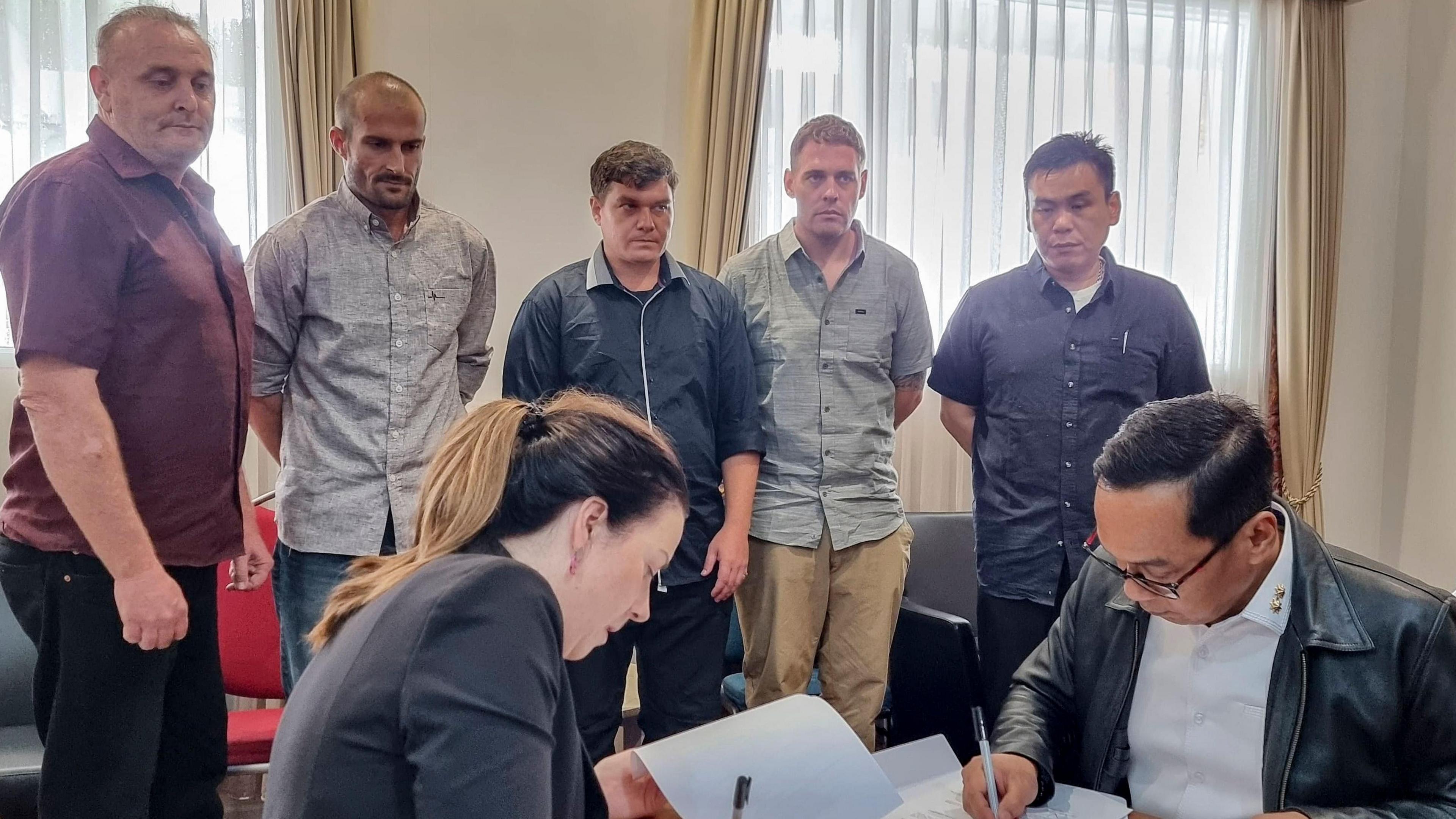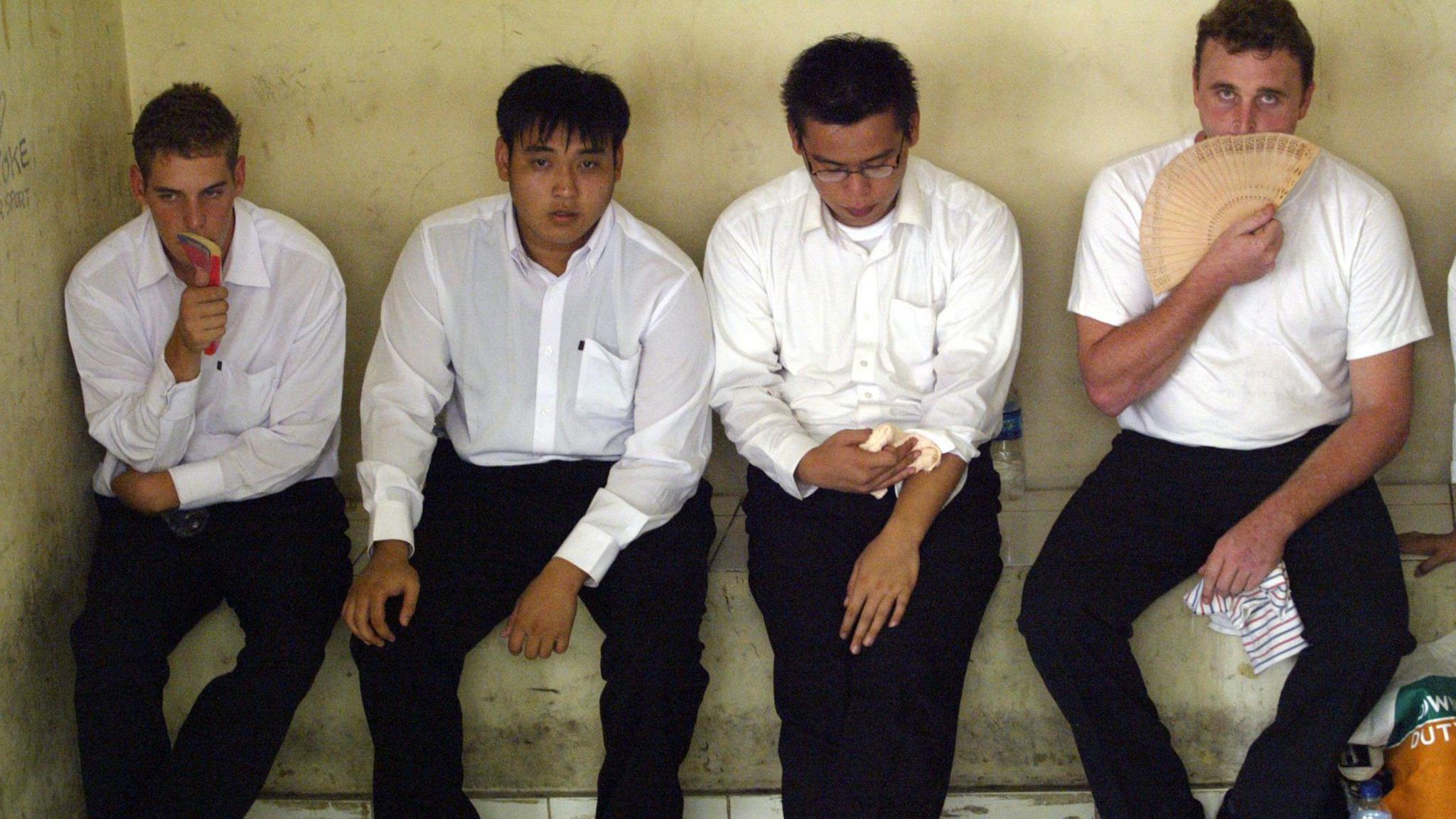Bali Nine drug smugglers 'relieved' to be back in Australia

(L-R, background) Martin Stephens, Michael Czugaj, Scott Rush, Matthew Norman and Si Yi Chen inside a room in Bali International Airport during a handover process for their return
- Published
The five remaining members of the infamous "Bali Nine" drug ring say they are "relieved and happy" to be home in Australia, after serving nearly 20 years in Indonesian prisons.
Matthew Norman, Scott Rush, Martin Stephens, Si Yi Chen, and Michael Czugaj arrived in Darwin on Sunday following years of lobbying by Australia on their behalf.
"They look forward, in time, to reintegrating back into and contributing to society," said a statement issued on behalf of the men and their families.
The high-profile case began in 2005 when Indonesia caught nine young Australians trying to smuggle 8.3kg (18lb) of heroin out of Bali strapped to their bodies.
The eight men and one woman were arrested at an airport and hotel in Bali after a tip-off from Australian police.
The case made global headlines when two of the gang's ringleaders, Andrew Chan and Myuran Sukumaran, were executed by firing squad in 2015 - sparking a diplomatic row between neighbours Indonesia and Australia.
Other members of the Bali Nine - most of whom were aged under 21 - were handed sentences of either 20 years or life in prison.
The case put a spotlight on Indonesia's strict drug laws, some of the most stringent in the world.
One of the nine, Tan Duc Thanh Nguyen, died of cancer in prison in 2018. Shortly afterwards, Renae Lawrence, then 41, the only woman among the group, had her sentence commuted after spending almost 13 years in prison and returned to Australia the same year.
Indonesia did not commute the sentences of the remaining five, now aged 38 to 48, and they were transported back to Australia as prisoners. However the Australian Broadcasting Corporation (ABC) has reported that the men are effectively free to live unhindered in Australian society.

Matthew Norman, Tan Duc Thanh Nguyen, Si Yi Chen and Martin Stephens in a cell as they awaited trial in 2005
The five are banned for life from entering Indonesia, a spokesman for the government there said in a statement.
On Monday, Australian Prime Minister Anthony Albanese said he had spoken to several of the men's "grateful" parents.
"They did a serious crime and they have rightly paid a serious price for it. But it was time for them to come home," he told reporters.
He said the deal did not come with conditions or favours Australia would have to repay: "This is an act of compassion by President Prabowo [Subianto] and we thank him for it."
The men and their families also said they were "immensely grateful" to Prabowo.
They also thanked the lawyers, diplomats and government figures who had helped advocate for them over the past two decades, before asking for privacy.
"The welfare of the men is a priority, they will need time and support, and we hope and trust our media and community will make allowance for this."
The five men are being put through medical checks at Darwin's Howard Springs facility - which was used for quarantine during the pandemic - and will begin a voluntary "rehabilitation process", Education Minister Jason Clare said. It is not clear what that entails, or how long the men will stay there.
He added that normal visa processes would apply to any Indonesian family members of the men, who did not follow them to Australia.
The Bishop of Townsville, Timothy Harris, who has supported the families of Scott Rush and Michael Czugaj since their arrests, said he immediately called Scott Rush's father Lee when he heard the news.
Scott's parents are eagerly awaiting the reunion, Bishop Harris told the BBC.
"They are mortified by what their son did. They always believed he has committed a crime... But this turn of events [has] filled them with a sense of anticipation."
However, he said it would take time for the men to heal from their experience and re-integrate into society.
"If you think that through, your son commits a crime [and was] incarcerated in a foreign country, they return. How does someone get re-integrated into the family, let alone society?"
"Things have changed. The relationships need to be rekindled. They are going to have to face that as time goes on," he said.
"Once [Scott's family] gets to embrace him... I hope and pray things will be better, because there's nothing like having your family [nearby]."